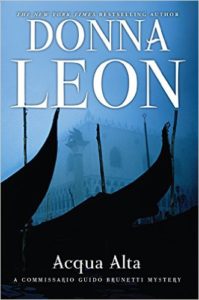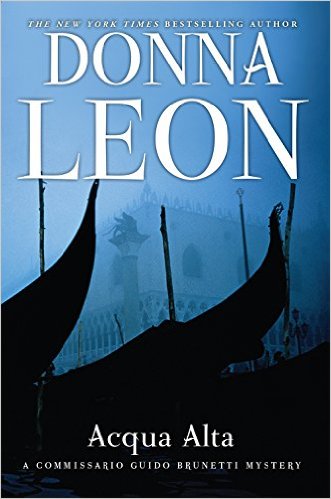
When a wealthy American woman is brutally beaten in the apartment she shares with her lover, the reigning diva at La Fenice, Commissario Guido Brunetti of the Venice police finds a way to insert himself into the investigation. (Yes, this is another Donna Leon novel about Venice.) He distrusts the uniformed officers assigned to the case — or, rather, he trusts that they will botch the job with their usual carelessness and incompetence.
Estimated reading time: 4 minutes
Then, shortly afterward, the murder of the director of the town’s leading museum raises the question whether the two events are connected. Brunetti seems to think so, since the American has recently returned from China, where she was managing the excavation of the famed terra cotta soldiers, and was scheduled to meet with the museum director just days later. Thus begins another of Donna Leon‘s fascinating tales of murder and corruption in Venice featuring the incorruptible policeman, Guido Brunetti.
Donna Leon’s Venice
Donna Leon, herself an American, has lived in Venice since the 1980s. Apparently, she speaks Italian well enough to be able to distinguish one regional dialect from another. (Italian as a national language is a modern creation. What’s spoken in one part of the country is still often difficult for someone in another region to understand.) Despite her loyalty to Italy, Leon displays a low opinion of the country’s officialdom. References to corruption in the Commissario Brunetti series are rampant.
For example, she writes, referring to the diva on a visit to her lover in the hospital, “Signora Petrelli had been at work on the hospital staff, seeing that the little envelopes, bustarelle, were delivered into the proper hands. In the absence of those ‘gifts,’ even the most basic services wouldn’t be performed for patients in this hospital, and even in their presence, it often fell to the family to feed and bathe the patient.”
Acqua Alta (Commissario Brunetti #5) by Donna Leon ★★★☆☆
Then, when describing an effort by one of Brunetti’s suspects to prove his innocence by furnishing receipts, Leon writes, “everyone in Italy had receipts for everything and . . . all of those receipts were utterly meaningless as anything other than evidence faked to avoid paying taxes.” As I noted in reviewing an earlier entry in the Commissario Brunetti series, it’s no wonder that Leon doesn’t permit her novels to be translated into Italian.
Where art, life, and murder intersect
Brett Lynch, the American woman, is a world-class archaeologist, an expert in ancient Chinese ceramics. As we would expect, her beating and the murder of the museum director are connected, and much of the story in Acqua Alta revolves around the ceramics on display in an exhibition that visited Venice in recent months. The tale is suspenseful and infused with Leon’s careful attention to detail: an interested reader can pick up several interesting tidbits about Chinese cultural history from this book. The novel’s title, which of course translates as High Water, points to another engaging element in the story. The rising tide floods the lower floors and sidewalks of Venice for days on end — a compelling image of what the world can expect from the steadily rising oceans around us.
However, there is a problem. Acqua Alta is marred by a crucial event not long before the end of the story that is, simply, impossible to believe. Dr. Lynch makes a choice that defies understanding. I refuse to believe that anyone of her intelligence and sophistication could be so stupid. Perhaps Ms. Leon had boxed herself into a corner in the plot and could think of no other way to extract herself. Though I was tempted to toss the book aside in disgust at that point, I soldiered through to the end. I was glad I did. Except for that lapse in plotting or character development, Acqua Alta is an example of detective fiction at its best.
For related reading
You might also enjoy my posts:
- Top 10 mystery and thriller series
- 20 excellent standalone mysteries and thrillers
- 30 outstanding detective series from around the world
- Top 20 suspenseful detective novels
- Top 10 historical mysteries and thrillers
And you can always find my most popular reviews, and the most recent ones, on the Home Page.


























